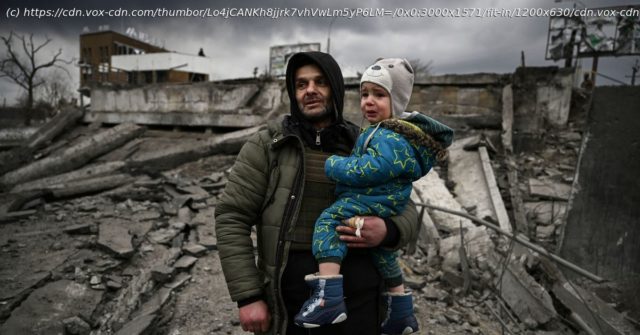Cities like Mariupol are running out of clean water, food, and medicine.
As Russian troops continue their assault on Ukraine, the humanitarian situation on the ground, particularly in besieged population centers like Mariupol, is becoming increasingly dire. Ceasefire violations mean there is no safe corridor for evacuations in many areas, while attacks on critical infrastructure have cut out heat, electricity, and water in some places. Critical supplies are also becoming dangerously scarce. Such shortages, as the war enters its third week, reflect a burgeoning humanitarian crisis — one that could grow far worse for Ukrainians who now have little prospect of escaping already besieged cities. The strategies behind the crisis, though, are considered a common element of Russian siege warfare tactics, according to Rita Konaev, the associate director of analysis at Georgetown University’s Center for Security and Emerging Technology, which are likely to spread as the war moves into a new phase. Already, the steady bombardment of cities is damaging civilian infrastructure, such as the hospital maternity ward in Mariupol that was struck just this week, killing three. In Kharkiv, Ukraine’s second-largest city, a care home for those with disabilities was reportedly shelled on Friday. Localized damage can have city-wide implications. According to Konaev, many cities are reliant on a “pretty fragile grid system of life-saving and life-necessity utilities. If you damage one pipe, it can damage water access or heating for thousands of people.” And mounting outages pose a growing threat: In Mariupol, a strategic port city in southern Ukraine, residents have gone without heat, water, and electricity for more than a week due to Russian bombardment. On Friday, Ukrainian President Volodymyr Zelenskyy announced renewed attempt to get critical humanitarian aid to the city. “Russian troops did not let our aid into the city and continue to torture our people, our Mariupol residents,” he said. “We will try again.” Dispatches from Mariupol, though, capture a city already in crisis. “All the shops and were looted five to four days ago,” Sasha Volkov, deputy head of the International Committee of the Red Cross (ICRC) in Mariupol, said in a video posted to Twitter. “People report varying needs in medicine, especially for diabetes and cancer patients. But there is no way to find it anymore in the city.” Audio posted by the aid group Médecins Sans Frontieres (MSF) from Mariupol is equally dire. “There is no drinking water and any medication for more than one week, maybe even 10 days, without drinking water and medication,” a local aid worker says in the recording. “There’s no places where we can find food, or even [drinkable] water.” On Wednesday, Mariupol Deputy Mayor Serhiy Orlov told journalists in a panel discussion that the water crisis in Mariupol is so acute that a 6-year-old child had died of dehydration.






